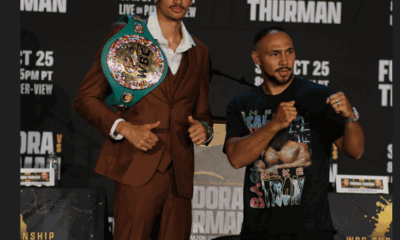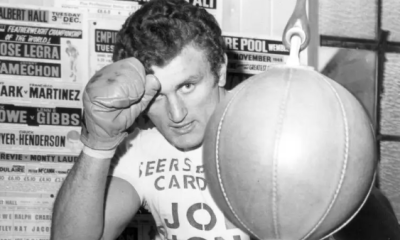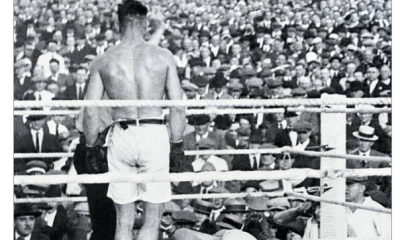Canada and USA
Schaefer Extends Olive Branch (sort of) to Oscar: Will They Team Up Again?
If the history of boxing has taught us anything, it is that today’s friend can be tomorrow’s enemy, and vice-versa. Temporary alliances can and are forged among bitter rivals because such arrangements can be profitable, with peace treaties of convenience shredded and old animosities restored once the business of the moment has been concluded.
The template for such grudgingly agreed-to unions was long ago established by polar opposites Bob Arum and Don King, who became the fight game’s equivalent of legendary feuders “Devil Anse” Hatfield and Randall McCoy. But despite loathing one another, the former attorney in President John F. Kennedy’s Justice Department and ex-Cleveland numbers hustler occasionally were known to grit their teeth and shake hands for photo-ops if the right fight could be made for the enrichment of their boxers and, of course, themselves.
Top Rank chairman Arum is still going strong at 85, but King, also 85, is now mostly a toothless lion in winter, his once-robust promotional company still operational but far less visible than in its glory days. That makes Golden Boy Promotions president Oscar De La Hoya and his former CEO, Richard Schaefer (pictured in happier times), their updated equivalents. The only differences – and they are significant – are that, where Arum and King never did much cotton to one another, De La Hoya and Schaefer were once as thick as thieves before having their epic falling-out, which resulted in both parties suing each other. The other possible difference is that Arum and King periodically ceased hostilities when doing so made financial sense; no one knows for sure just yet whether De La Hoya and Schaefer, now the head of the start-up Ringstar Promotions, can find enough middle ground upon which similarly transient truces could be negotiated.
For his part, Schaefer, while admitting to lingering fallout from the way he and De La Hoya ended their personal and professional relationships, extended a figurative olive branch to his onetime friend. Schaefer is a key figure in something called the World Boxing Super Series, in which two yet-to-be-announced weight divisions would provide the participants in eight-fighter tournaments designed to elevate the winners to best-in-class status. Asked whether Golden Boy fighters conceivably could be invited to participate in the WBSS tourneys, Schaefer said he’d have no objection to opening that door, or the one that might lead to independent co-promotions.
“At first I had hard feelings,” the former Swiss investment banker told me. “We sued each other, then we settled it. It was nasty. He said some pretty bad things about me which were not accurate. He blamed me for stuff he had no reason to blame me for.
“I’m very proud of what I accomplished at Golden Boy and the work I did for Oscar. I made a lot of money for him. There are very few athletes who have done as well, and I think Oscar knows that. I’m sure since I’ve left it has not been the same.
“But I have no hard feelings at this point. What happened before is in my rear-view mirror. You move forward. I know if I see Oscar, I don’t have to look the other way, nor does he. I can definitely see us at some point working together on a fight again. He’s not my enemy. As you get older, the idea (of holding grudges) becomes less important.”
While something less than an admission that all had been forgiven, Schaefer’s comments literally begged for a response from De La Hoya. Might he, too, imagine enough of a patching up of old differences that he and Schaefer might reprise King and Arum at their figurative Yalta?
For nearly two weeks, my quest to speak directly to Oscar for a response proved futile. Yes, he has a busy schedule, what with the May 6 all-Mexican megafight between his guy, Canelo Alvarez (48-1-1, 34 KOs), and celebrity son Julio Cesar Chavez Jr. (50-2-1, 32 KOs), coming up at Las Vegas’ T-Mobile Arena. But sometimes a particular chase leads nowhere, so I was obliged to settle for a one-paragraph statement from De La Hoya issued through his publicist, Stefan Friedman.
“Since I took over day-to-day operations of the company, Golden Boy Promotions has been willing to work with any promoter so long as we can make the best fights for the fans,” the statement reads. “That remains as true today as it ever has.”
There is no mention of Schaefer by name, or anything suggesting a direct response to Schaefer’s semi-conciliatory comments. On the face of it, De La Hoya’s statement is bland, cold and hints at a fractured relationship that remains in considerable disrepair. So perhaps a recap of what led to those raw emotions is in order.
The primary sticking point between the two was De La Hoya’s allegation that Schaefer had breached his fiduciary responsibility by allowing a number of high-profile, Al Haymon-controlled fighters, who at one time regularly appeared on Golden Boy cards, free to go elsewhere when their promotional contracts expired and were not renewed. There were allegations that Schaefer was a bit too cozy with Haymon and Floyd Mayweather Jr., both of whom withdrew from their spots under the Golden Boy umbrella and formed their own companies, with each vowing to open an executive position for Schaefer should he decide to split from De La Hoya.
Schaefer denied any wrongdoing, saying, at the time the fissures in his relationship with De La Hoya had become increasingly evident, that he had “started Golden Boy (in 2000) from nothing and made it the No. 1 boxing promoter.”
As part of the settlement, Schaefer agreed to refrain from involvement in boxing promotional activities of any kind until August 2015. Although he could have returned then, he claims to have enjoyed his time away from the sport, and did not return until June 2016.
“Truth be told, in the beginning I was interested to get back as soon as possible,” he said of his enforced and then voluntary absence from the fight scene. “But after a few weeks, taking a step back, I actually enjoyed my time away. I began to ask myself if I really wanted to go back into boxing promotion, or to do something totally different. I only went to a handful of fights, but the fans and the sponsors would tell me they wanted me back. I could have come back in the summer of 2015, but didn’t, which shows that I was a bit on the fence.
“I took my time because I wanted to be sure that I wanted to do this again. But once the boxing bug bites you, it’s difficult to get rid of it. I’ve made so many friends in boxing. Oh, sure, there are a lot of bad feelings as well. It can be a very nasty business. But look at Arum and King. They’re in their mid-80s and still promoting. That’s the beauty of boxing.”
References to Arum and King, frequent opponents and occasional partners, were bound to be made once Schaefer launched Ringstar as a likely adversary to De La Hoya, his former friend and associate. Consider the circus-like scene at Bally’s Atlantic City on March 18, 2006, when Arum and King appeared at a press conference to hype a fight three weeks later between the Arum-promoted Mayweather and the King-promoted Zab Judah. The press conference had its own working title – “Sworn Enemies!” – and it was billed as a “once-in-a-lifetime” joint forum, although that was a bit pretentious, the two arch-rivals having most recently worked together for the Sept. 18, 1999, welterweight unification matchup of undefeated champions De La Hoya, then promoted by Arum, and King’s Felix Trinidad. Trinidad won a disputed majority decision and King, during a self-indulgent monologue at the postfight press conference, had the power to his microphone turned off by an Arum employee.
Joke all you want about Arum and King, not their Oscars and Felixes, being the real Odd Couple. These guys were big enough, or at least smart enough, to allow bygones to be bygones if there was a profit to be made by joining forces. Arum, shifting from King, who had once dubbed him a “master of trickeration,” to new objects of scorn, put the bull’s-eye on his former fighter, De La Hoya, and the Golden Boy’s perceived partner in crime, Schaefer.
“Recently, unfortunately, what’s happening in boxing, fighters – encouraged by various entities in the sport – felt that they could be fighters as well as their own promoters,” Arum said. “Well, they can’t be, just as I can’t go in the ring and jab and throw left hooks and right crosses. Neither can a Swiss banker who has no background in boxing and no background in meeting the public, call himself a promoter. But as long as networks encourage that kind of action, we’re going to have rough patches in boxing.”
It is a curious turn of events, or maybe not, that De La Hoya and Arum have smoothed over their particular rough patch. Schaefer, still bristling from the barbs Arum had directed at him, appears disinclined ever to break bread with the Top Rank honcho, all claims to not holding grudges notwithstanding.
The more things change in boxing, the more they appear to be the same. Take the World Boxing Super Series, for instance. It is a recycled notion that, at various times, has been trotted out with varying degrees of success and failure. But like the saying goes, if at first you don’t succeed …
“The fans want to see the best fighting the best,” said Schaefer, who came aboard as the American facilitator for a grand plan designed and financed by Europeans Kalle Sauerland, Matthew Hooper and Roberto Dalmiglio. “They also like tournaments, especially if it’s an easy-to-follow format, like the NCAA basketball tournament.”
The most successful stab at what the WBSS is attempting was the Super Six World Boxing Classic, which was organized by Showtime and was staged over a 20-month period, from Oct. 17, 2009, to Dec. 17, 2011, when super middleweight Andre Ward took top honors by outpointing England’s Carl Froch in the finale at Atlantic City Boardwalk Hall. There were glitches – the length of the process for one thing, and the fact that three of the originally announced six entrants dropped out at various stages – but, all told, things went reasonably well. On a scale of one to 10, I’d give the noble experiment a seven. Not too shabby. And Ward, the only U.S. gold medalist at the 2004 Athens Olympics, emerged as a candidate for the world’s best pound-for-pound fighter, and on the cusp of superstardom.
A preceding event, the United States Boxing Championships, began with much fanfare in 1976 on ABC. King sold the network on the concept, which would presumably capitalize on the U.S. Bicentennial celebration and the success of America’s 1976 Olympic boxing team that took five gold medals in Montreal. But ratings for the tournament were rigged, records falsified, deserving entrants denied a place in the field (Marvin Hagler didn’t make the eight-fighter middleweight cut because he would not agree to certain onerous conditions, but three guys he defeated did) and, once the scope of the scandal was revealed, ABC pulled the plug on April 10, 1977.
Will the latest attempt to fit boxing within the parameters of a single-elimination tournament work? Who knows? But this much should be obvious: should Schaefer place a call to De La Hoya to inquire about the possible participation of Golden Boy fighters, I’d want to listen in on that conversation.
Check out more boxing news on video at The Boxing Channel.
-

 Book Review4 weeks ago
Book Review4 weeks agoMark Kriegel’s New Book About Mike Tyson is a Must-Read
-

 Featured Articles3 weeks ago
Featured Articles3 weeks agoThe Hauser Report: Debunking Two Myths and Other Notes
-

 Featured Articles3 weeks ago
Featured Articles3 weeks agoMoses Itauma Continues his Rapid Rise; Steamrolls Dillian Whyte in Riyadh
-

 Featured Articles3 weeks ago
Featured Articles3 weeks agoNikita Tszyu and Australia’s Short-Lived Boxing Renaissance
-

 Featured Articles4 weeks ago
Featured Articles4 weeks agoKotari and Urakawa – Two Fatalities on the Same Card in Japan: Boxing’s Darkest Day
-

 Featured Articles3 weeks ago
Featured Articles3 weeks agoIs Moses Itauma the Next Mike Tyson?
-

 Featured Articles2 weeks ago
Featured Articles2 weeks agoBoxing Odds and Ends: Paul vs ‘Tank,’ Big Trouble for Marselles Brown and More
-

 Featured Articles2 weeks ago
Featured Articles2 weeks agoAvila Perspective, Chap. 340: MVP in Orlando This Weekend




















